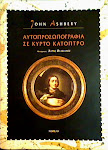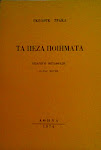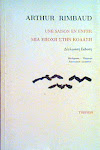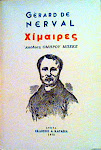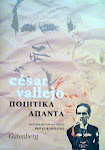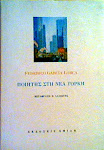Δ. Π. ΠΑΠΑΔΙΤΣΑΣ - Εν Πάτμω Ι.
Η μικρά σκέψις ως κρώζον πτηνό
εκ του ύφους σκοπεύει τη σάρκα
το ξηρό δέντρο
η σκληρή πέτρα που ελαξεύθη
απ' το ακαταμάχητο όνειρο
και στην Πάτμο ανεστράφη η καρδία
και μαράθηκε το άνθος το πικρό
Ω ξηρό δέντρο διάφανο
δια να βλέπομεν άστρα
δια να βλέπομε πίδακες κίτρων
και εις κόπρον αλόγων
σπόρους δασών
δια να βλέπομε σύννεφα
και ρομφαίες ψιθύρων
Η στενωπός εκ της καρδίας κατέβαινε
κι ανέβαιναν αύρες
ως διάφανα όνειρα
κι από των παραθύρων τα ολάνοιχτα βλέφαρα
έχυναν μέσα
γλυκείς στεναγμούς των αγίων
Γραίες εβάδιζαν, παιδία
επί του λιθοστρώτου έγραφαν τους ήχους
του μέλλοντος
οι όρχεις των λάμποντα νούφαρα
έπιναν τα λιμνάζοντα ύδατα
ενώ τα φύλλα εδρόσιζαν
τα γόνατα των απομάχων
Και η μικρά σκέψις
μη ομοιάζουσα πλέον με πτηνό
απέκτησεν ιριδισμούς που έφεγγαν
και ούτω αι καρδίαι του πλήθους
ωμοίαζαν με κατοικίες αλιέων
τη νύχτα
Και όπως του φοίνικος
ο χρόνος αφαιρεί τους κλάδους
και ανέρχεται ο κορμός του
εν μέσβ ηλίου και ανέμων
της διανοίας παρομοίως
συνέβη η άνοδος.
ΝΙΚΟΣ ΚΑΡΟΥΖΟΣ - Ρομαντικός Επίλογος
Ρομαντικὸς ἐπίλογος
Μὴ μὲ διαβάζετε ὅταν δὲν ἔχετε
παρακολουθήσει κηδεῖες ἀγνώστων
ἢ ἔστω μνημόσυνα.
Ὅταν δὲν ἔχετε
μαντέψει τὴ δύναμη
ποὺ κάνει τὴν ἀγάπη
ἐφάμιλλη τοῦ θανάτου.
Ὅταν δὲν ἀμολήσατε ἀϊτὸ τὴν Καθαρὴ Δευτέρα
χωρὶς νὰ τὸν βασανίζετε
τραβώντας ὁλοένα τὸ σπάγγο.
Ὅταν δὲν ξέρετε πότε μύριζε τὰ λουλούδια
ὁ Νοστράδαμος.
Ὅταν δὲν πήγατε τουλάχιστο μιὰ φορὰ
στὴν Ἀποκαθήλωση.
Ὅταν δὲν ξέρετε κανέναν ὑπερσυντέλικο.
Ἂν δὲν ἀγαπᾶτε τὰ ζῶα
καὶ μάλιστα τὶς νυφίτσες.
Ἂν δὲν ἀκοῦτε τοὺς κεραυνοὺς εὐχάριστα
ὁπουδήποτε.
Ὅταν δὲν ξέρετε πῶς ὁ ὡραῖος Modigliani
τρεῖς ἡ ὥρα τὴ νύχτα μεθυσμένος
χτυποῦσε βίαια τὴν πόρτα ἑνὸς φίλου του
γυρεύοντας τὰ ποιήματα τοῦ Βιγιὸν
κι ἄρχισε νὰ διαβάζει ὦρες δυνατὰ
ἐνοχλώντας τὸ σύμπαν.
Ὅταν λέτε τὴ φύση μητέρα μας καὶ ὄχι θεία μας
Ὅταν δὲν πίνετε χαρούμενα τὸ ἀθῶο νεράκι.
Ἂν δὲν καταλάβατε πῶς ἡ Ἀνθοῦσα
εἶναι μᾶλλον ἡ ἐποχή μας.
ΠΡΟΣΟΧΗ
ΧΡΩΜΑΤΑ
Μὴ μὲ διαβάζετε
ὅταν
ἔχετε
δίκιο.
Μὴ μὲ διαβάζετε ὅταν
δὲν ἤρθατε σὲ ρήξη μὲ τὸ σῶμα...
Ὥρα νὰ πηγαίνω
δὲν ἔχω ἄλλο στῆθος.
GEORG TRAKL - Gesang des Abgeschiedenen
Voll Harmonien ist der Flug der Vögel. Es haben die grünen Wälder
Am Abend sich zu stilleren Hütten versammelt;
Die kristallenen Weiden des Rehs.
Dunkles besänftigt das Plätschern des Bachs, die feuchten Schatten
Und die Blumen des Sommers, die schön im Winde läuten.
Schon dämmert die Stirne dem sinnenden Menschen.
Und es leuchtet ein Lämpchen, das Gute, in seinem Herzen
Und der Frieden des Mahls; denn geheiligt ist Brot und Wein
Von Gottes Händen, und es schaut aus nächtigen Augen
Stille dich der Bruder an, daß er ruhe von dorniger Wanderschaft.
O das Wohnen in der beseelten Bläue der Nacht.
Liebend auch umfängt das Schweigen im Zimmer die Schatten der Alten,
Die purpurnen Martern, Klage eines großen Geschlechts,
Das fromm nun hingeht im einsamen Enkel.
Denn strahlender immer erwacht aus schwarzen Minuten des Wahnsinns
Der Duldende an versteinerter Schwelle
Und es umfangt ihn gewaltig die kühle Bläue und die leuchtende Neige des Herbstes,
Das stille Haus und die Sagen des Waldes,
Maß und Gesetz und die mondenen Pfade der Abgeschiedenen.
GUILLAUME APOLLINAIRE - Chant De L'horizon En Champagne
Voici le nez des soldats invisibles
Moi l'horizon invisible je chante
Que les civils et les femmes écoutent ces chansons
Et voici d'abord la cantilène du brancardier blessé
Le sol est blanc la nuit l'azure
Saigne la crucifixion
Tandis que saigne la blessure
Du soldat de Promission
Un chien jappait l'obus miaule
La lueur muette a jailli
À savoir si la guerre est drôle
Les masques n'ont pas tressailli
Mais quel fou rire sous le masque
Blancheur éternelle d'ici
Où la colombe porte un casque
Et l'acier s'envole aussi
Je suis seul sur le champ de bataille
Je suis la tranchée blanche le bois vert et roux
L'obus miaule
Je te tuerai
Animez-vous fantassins à passepoil jaune
Grands artilleurs roux comme des taupes
Bleu-de-roi comme les golfes méditerranéens
Veloutés de toutes les nuances du velours
Ou mauves encore ou bleu-horizon comme les autres
Ou déteints
Venez le pot en tête
Debout fusée éclairante
Danse grenadier en agitant tes pommes de pin
Alidades des triangles de visée pointez-vous sur les lueurs
Creusez des trous enfants de 20 ans creusez des trous
Sculptez les profondeurs
Envolez-vous essaims des avions blonds ainsi que les avettes
Moi l'horizon je fais la roue comme un grand Paon
Écoutez renaître les oracles qui avaient cessé
Le grand Pan est ressuscité
Champagne viril qui émoustille la Champagne
Hommes faits jeunes gens
Caméléon des autos-canons
Et vous classe 16
Craquements des arrivées ou bien floraison blanche dans les cieux
J'était content pourtant ça brûlait la paupière
Les officiers captifs voulaient cacher leurs noms
Œil du Breton blessé couché sur la civière
Et qui criait aux morts aux sapins aux canons
Priez pour moi Bon Dieu je suis le pauvre Pierre
Boyaux et rumeur du canon
Sur cette mer aux blanches vagues
Fou stoïque comme Zénon
Pilote du cœur tu zigzagues
Petites forêts de sapins
La nichée attend la becquée
Pointe-t-il des nez de lapins
Comme l'euphorbe verruquée
Ainsi que l'euphorbe d'ici
Le soleil à peine boutonne
Je l'adore comme un Parsi
Ce tout petit soleil d'automne
Un fantassin presque un enfant
Bleu comme le jour qui s'écoule
Beau comme mon cœur triomphant
Disait en mettant sa cagoule
Tandis que nous n'y sommes pas
Que de filles deviennent belles
Voici l'hiver et pas à pas
Leur beauté s'éloignera d'elles
Ô Lueurs soudaines des tirs
Cette beauté que j'imagine
Faute d'avoir des souvenirs
Tire de vous son origine
Car elle n'est rien que l'ardeur
De la bataille violente
Et de la terrible lueur
Il s'est fait une muse ardente
Il regarde longtemps l'horizon
Couteaux tonneaux d'eaux
Des lanternes allumées se sont croisées
Moi l'horizon je combattrai pour la victoire
Je suis l'invisible qui ne peut disparaître
Je suis comme l'onde
Allons ouvrez les écluses que je me précipite et renverse tout
ROBERT DESNOS - Identité des images
Je me bats avec fureur contre des animaux et des bouteilles
Depuis peu de temps peut-être dix heures sont
passées l'une après l'autre
La belle nageuse qui avait peur du corail ce matin s'éveille
Le corail couronné de houx frappe à sa porte
Ah! encore le charbon toujours le charbon
Je t'en conjure charbon génie tutélaire du rêve et da ma
solitude laisse-moi laisse-moi parler encore de la
belle nageuse qui avait peur du corail
Ne tyrannise plus ce séduisant sujet de mes rêves
La belle nageuse reposait dans un lit de dentelles et d'oiseaux
Les vêtements sur une chaise au pied du lit étaient
illuminés par les lueurs les dernières lueurs du charbon
Celui-ci venu des profondeurs du ciel de la terre et
de la mer était fier de son bec de corail et de ses
grandes ailes de crêpe
Il avait toute la nuit suivi des enterrements
divergents vers des cimetières suburbains
Il avait assisté à des bals dans les ambassades
marqué de son empreinte une feuille de fougère
des robes de satin blanc
It s'était dressé terrible à l'avant des navires et les
navires n'étaient pas revenus
Maintenant tapi dans la cheminée il guettait le
réveil de l'écume et le chant des bouilloires
Son pas retentissant avait troublé le silence des
nuits dans les rues aux pavés sonores
Charbon sonore charbon maître du rêve charbon
Ah dis-moi où est-elle cette belle nageuse cette
nageuse qui avait peur du corail?
Mais la nageuse elle-même s'est rendormie
Et je reste face à face avec le feu et je resterai
la nuit durant à interroger le charbon aux ailes
de ténèbres qui persiste à projeter sur mon
chemin monotone l'ombre de ses fumées et le
reflet terrible de ses braises
Charbon sonore charbon impitoyable charbon.
PERSY BYSSHE SHELLEY - Remorse
Rapid clouds have drunk the last pale beam of even:
Away! the gathering winds will call the darkness soon,
And profoundest midnight shroud the serene lights of heaven.
Pause not! the time is past! Every voice cries 'Away!'
Tempt not with one last tear thy friend's ungentle mood:
Thy lover's eye, so glazed and cold, dares not entreat thy stay:
Duty and dereliction guide thee back to solitude.
Away, away! to thy sad and silent home;
Pour bitter tears on its desolated hearth;
Watch the dim shades as like ghosts they go and come,
And complicate strange webs of melancholy mirth.
The leaves of wasted autumn woods shall float around thine head,
The blooms of dewy Spring shall gleam beneath thy feet:
But thy soul or this world must fade in the frost that binds the dead,
Ere midnight's frown and morning's smile, ere thou and peace, may meet.
The cloud shadows of midnight possess their own repose,
For the weary winds are silent, or the moon is in the deep;
Some respite to its turbulence unresting ocean knows;
Whatever moves or toils or grieves hath its appointed sleep.
Thou in the grave shall rest:--yet, till the phantoms flee,
Which that house and heath and garden made dear to thee erewhile,
Thy remembrance and repentance and deep musings are not free
From the music of two voices, and the light of one sweet smile.
RENE CHAR - Δύο Ποιήματα ("Το Αδέσποτο σφυρί", μετάφραση: Σωκράτης Ζερβός, Εστία 1992)
Οι μεγάλοι δρόμοι
κοιμούνται στον ίσκιο των χεριών της
Βαδίζει στο μαρτύριο
αύριο
σαν μια γραμμή μπαρούτι.
Ο ΧΡΗΣΜΟΣ ΤΗΣ ΜΕΓΑΛΗΣ ΠΟΡΤΟΚΑΛΙΑΣ
Ο άνθρωπος που παίρνει το αυτονόητο στους ώμους του
κρατά την ανάμνηση των κυμάτων στις αλαταποθήκες.
THOMAS CHATTERTON - An Excelente Balade Of Charitie
- In Virgynë the sweltrie sun gan sheene,
- And hotte upon the mees did caste his raie;
- The apple rodded from its palie greene,
- And the mole peare did bende the leafy spraie;
- The peede chelandri sunge the livelong daie;
- 'Twas nowe the pride, the manhode of the yeare,
- And eke the grounde was dighte in its moste defte aumere.
- The sun was glemeing in the midde of daie,
- Deadde still the aire, and eke the welken blue,
- When from the sea arist in drear arraie
- A hepe of cloudes of sable sullen hue,
- The which full fast unto the woodlande drewe,
- Hiltring attenes the sunnis fetive face,
- And the blacke tempeste swolne and gatherd up apace.
- Beneathe an holme, faste by a pathwaie side,
- Which dide unto Seyncte Godwine's covent lede,
- A hapless pilgrim moneynge did abide.
- Pore in his newe, ungentle in his weede,
- Longe bretful of the miseries of neede,
- Where from the hail-stone coulde the almer flie?
- He had no housen theere, ne anie covent nie.
- Look in his glommed face, his sprighte there scanne;
- Howe woe-be-gone, how withered, forwynd, deade!
- Haste to thie church-glebe-house, asshrewed manne!
- Haste to thie kiste, thie onlie dortoure bedde.
- Cale, as the claie whiche will gre on thie hedde,
- Is Charitie and Love aminge highe elves;
- Knightis and Barons live for pleasure and themselves.
- The gatherd storme is rype; the bigge drops falle;
- The forswat meadowes smethe, and drenche the raine;
- The comyng ghastness do the cattle pall,
- And the full flockes are drivynge ore the plaine;
- Dashde from the cloudes the waters flott againe;
- The welkin opes; the yellow levynne flies;
- And the hot fierie smothe in the wide lowings dies.
- Liste! now the thunder's rattling clymmynge sound
- Cheves slowlie on, and then embollen clangs,
- Shakes the hie spyre, and losst, dispended, drown'd,
- Still on the gallard eare of terroure hanges;
- The windes are up; the lofty elmen swanges;
- Again the levynne and the thunder poures,
- And the full cloudes are braste attenes in stonen showers.
- Spurreynge his palfrie oere the watrie plaine,
- The Abbote of Seyncte Godwynes convente came;
- His chapournette was drented with the reine,
- And his pencte gyrdle met with mickle shame;
- He aynewarde tolde his bederoll at the same;
- The storme encreasen, and he drew aside,
- With the mist almes craver neere to the holme to bide.
- His cope was all of Lyncolne clothe so fyne,
- With a gold button fasten'd neere his chynne;
- His autremete was edged with golden twynne,
- And his shoone pyke a loverds mighte have binne;
- Full well it shewn he thoughten coste no sinne:
- The trammels of the palfrye pleasde his sighte,
- For the horse-millanare his head with roses dighte.
- "An almes, sir prieste!" the droppynge pilgrim saide,
- "O! let me waite within your covente dore,
- Till the sunne sheneth hie above our heade,
- And the loude tempeste of the aire is oer;
- Helpless and ould am I alas! and poor;
- No house, ne friend, ne moneie in my pouche;
- All yatte I call my owne is this my silver crouche."
- "Varlet," replyd the Abbatte, "cease your dinne;
- This is no season almes and prayers to give;
- Mie porter never lets a faitour in;
- None touch mie rynge who not in honour live."
- And now the sonne with the blacke cloudes did stryve,
- And shettynge on the grounde his glairie raie,
- The Abbatte spurrde his steede, and eftsoones roadde awaie.
- Once moe the skie was blacke, the thunder rolde;
- Faste reyneynge oer the plaine a prieste was seen;
- Ne dighte full proude, ne buttoned up in golde;
- His cope and jape were graie, and eke were clene;
- A Limitoure he was of order seene;
- And from the pathwaie side then turned hee,
- Where the pore almer laie binethe the holmen tree.
- "An almes, sir priest!" the droppynge pilgrim sayde,
- "For sweete Seyncte Marie and your order sake."
- The Limitoure then loosen'd his pouche threade,
- And did thereoute a groate of silver take;
- The mister pilgrim dyd for halline shake.
- "Here take this silver, it maie eathe thie care;
- We are Goddes stewards all, nete of oure owne we bare.
- "But ah! unhailie pilgrim, lerne of me,
- Scathe anie give a rentrolle to their Lorde.
- Here take my semecope, thou arte bare I see;
- Tis thyne; the Seynctes will give me mie rewarde."
- He left the pilgrim, and his waie aborde.
- Virgynne and hallie Seyncte, who sitte yn gloure,
- Or give the mittee will, or give the gode man power.
WILLIAM BLAKE - London
Near where the chartered Thames does flow,
A mark in every face I meet,
Marks of weakness, marks of woe.
In every cry of every man,
In every infant's cry of fear,
In every voice, in every ban,
The mind-forged manacles I hear:
How the chimney-sweeper's cry
Every blackening church appalls,
And the hapless soldier's sigh
Runs in blood down palace-walls.
But most, through midnight streets I hear
How the youthful harlot's curse
Blasts the new-born infant's tear,
And blights with plagues the marriage-hearse.
WALT WHITMAN - I sing the body electric
I sing the body electric,
The armies of those I love engirth me and I engirth them,
They will not let me off till I go with them, respond to them,
And discorrupt them, and charge them full with the charge of the soul.
Was it doubted that those who corrupt their own bodies conceal themselves?
And if those who defile the living are as bad as they who defile the dead?
And if the body does not do fully as much as the soul?
And if the body were not the soul, what is the soul ?
2
The love of the body of man or woman balks account, the body itself
balks account,
That of the male is perfect, and that of the female is perfect.
The expression of the face balks account,
But the expression of a well-made man appears not only in his face,
It is in his limbs and joints also, it is curiously in the joints of
his hips and wrists,
It is in his walk, the carriage of his neck, the flex of his waist
and knees, dress does not hide him,
The strong sweet quality he has strikes through the cotton and broadcloth,
To see him pass conveys as much as the best poem, perhaps more,
You linger to see his back, and the back of his neck and shoulder-side.
The sprawl and fulness of babes, the bosoms and heads of women, the
folds of their dress, their style as we pass in the street, the
contour of their shape downwards,
The swimmer naked in the swimming-bath, seen as he swims through
the transparent green-shine, or lies with his face up and rolls
silently to and from the heave of the water,
The bending forward and backward of rowers in row-boats, the
horse-man in his saddle,
Girls, mothers, house-keepers, in all their performances,
The group of laborers seated at noon-time with their open
dinner-kettles, and their wives waiting,
The female soothing a child, the farmer's daughter in the garden or
cow-yard,
The young fellow hosing corn, the sleigh-driver driving his six
horses through the crowd,
The wrestle of wrestlers, two apprentice-boys, quite grown, lusty,
good-natured, native-born, out on the vacant lot at sundown after work,
The coats and caps thrown down, the embrace of love and resistance,
The upper-hold and under-hold, the hair rumpled over and blinding the eyes;
The march of firemen in their own costumes, the play of masculine
muscle through clean-setting trowsers and waist-straps,
The slow return from the fire, the pause when the bell strikes
suddenly again, and the listening on the alert,
The natural, perfect, varied attitudes, the bent head, the curv'd
neck and the counting;
Such-like I love--I loosen myself, pass freely, am at the mother's
breast with the little child,
Swim with the swimmers, wrestle with wrestlers, march in line with
the firemen, and pause, listen, count.
3
I knew a man, a common farmer, the father of five sons,
And in them the fathers of sons, and in them the fathers of sons.
This man was a wonderful vigor, calmness, beauty of person,
The shape of his head, the pale yellow and white of his hair and
beard, the immeasurable meaning of his black eyes, the richness
and breadth of his manners,
These I used to go and visit him to see, he was wise also,
He was six feet tall, he was over eighty years old, his sons were
massive, clean, bearded, tan-faced, handsome,
They and his daughters loved him, all who saw him loved him,
They did not love him by allowance, they loved him with personal love,
He drank water only, the blood show'd like scarlet through the
clear-brown skin of his face,
He was a frequent gunner and fisher, he sail'd his boat himself, he
had a fine one presented to him by a ship-joiner, he had
fowling-pieces presented to him by men that loved him,
When he went with his five sons and many grand-sons to hunt or fish,
you would pick him out as the most beautiful and vigorous of the gang,
You would wish long and long to be with him, you would wish to sit
by him in the boat that you and he might touch each other.
4
I have perceiv'd that to be with those I like is enough,
To stop in company with the rest at evening is enough,
To be surrounded by beautiful, curious, breathing, laughing flesh is enough,
To pass among them or touch any one, or rest my arm ever so lightly
round his or her neck for a moment, what is this then?
I do not ask any more delight, I swim in it as in a sea.
There is something in staying close to men and women and looking
on them, and in the contact and odor of them, that pleases the soul well,
All things please the soul, but these please the soul well.
5
This is the female form,
A divine nimbus exhales from it from head to foot,
It attracts with fierce undeniable attraction,
I am drawn by its breath as if I were no more than a helpless vapor,
all falls aside but myself and it,
books, art, religion, time, the visible and solid earth, and what
was expected of heaven or fear'd of hell, are now consumed,
Mad filaments, ungovernable shoots play out of it, the response
likewise ungovernable,
Hair, bosom, hips, bend of legs, negligent falling hands all
diffused, mine too diffused,
Ebb stung by the flow and flow stung by the ebb, love-flesh swelling
and deliciously aching,
Limitless limpid jets of love hot and enormous, quivering jelly of
love, white-blow and delirious nice,
Bridegroom night of love working surely and softly into the prostrate dawn,
Undulating into the willing and yielding day,
Lost in the cleave of the clasping and sweet-flesh'd day.
This the nucleus--after the child is born of woman, man is born of woman,
This the bath of birth, this the merge of small and large, and the
outlet again.
Be not ashamed women, your privilege encloses the rest, and is the
exit of the rest,
You are the gates of the body, and you are the gates of the soul.
The female contains all qualities and tempers them,
She is in her place and moves with perfect balance,
She is all things duly veil'd, she is both passive and active,
She is to conceive daughters as well as sons, and sons as well as daughters.
As I see my soul reflected in Nature,
As I see through a mist, One with inexpressible completeness,
sanity, beauty,
See the bent head and arms folded over the breast, the Female I see.
6
The male is not less the soul nor more, he too is in his place,
He too is all qualities, he is action and power,
The flush of the known universe is in him,
Scorn becomes him well, and appetite and defiance become him well,
The wildest largest passions, bliss that is utmost, sorrow that is
utmost become him well, pride is for him,
The full-spread pride of man is calming and excellent to the soul,
Knowledge becomes him, he likes it always, he brings every thing to
the test of himself,
Whatever the survey, whatever the sea and the sail he strikes
soundings at last only here,
(Where else does he strike soundings except here?)
The man's body is sacred and the woman's body is sacred,
No matter who it is, it is sacred--is it the meanest one in the
laborers' gang?
Is it one of the dull-faced immigrants just landed on the wharf?
Each belongs here or anywhere just as much as the well-off, just as
much as you,
Each has his or her place in the procession.
(All is a procession,
The universe is a procession with measured and perfect motion.)
Do you know so much yourself that you call the meanest ignorant?
Do you suppose you have a right to a good sight, and he or she has
no right to a sight?
Do you think matter has cohered together from its diffuse float, and
the soil is on the surface, and water runs and vegetation sprouts,
For you only, and not for him and her?
7
A man's body at auction,
(For before the war I often go to the slave-mart and watch the sale,)
I help the auctioneer, the sloven does not half know his business.
Gentlemen look on this wonder,
Whatever the bids of the bidders they cannot be high enough for it,
For it the globe lay preparing quintillions of years without one
animal or plant,
For it the revolving cycles truly and steadily roll'd.
In this head the all-baffling brain,
In it and below it the makings of heroes.
Examine these limbs, red, black, or white, they are cunning in
tendon and nerve,
They shall be stript that you may see them.
Exquisite senses, life-lit eyes, pluck, volition,
Flakes of breast-muscle, pliant backbone and neck, flesh not flabby,
good-sized arms and legs,
And wonders within there yet.
Within there runs blood,
The same old blood! the same red-running blood!
There swells and jets a heart, there all passions, desires,
reachings, aspirations,
(Do you think they are not there because they are not express'd in
parlors and lecture-rooms?)
This is not only one man, this the father of those who shall be
fathers in their turns,
In him the start of populous states and rich republics,
Of him countless immortal lives with countless embodiments and enjoyments.
How do you know who shall come from the offspring of his offspring
through the centuries?
(Who might you find you have come from yourself, if you could trace
back through the centuries?)
8
A woman's body at auction,
She too is not only herself, she is the teeming mother of mothers,
She is the bearer of them that shall grow and be mates to the mothers.
Have you ever loved the body of a woman?
Have you ever loved the body of a man?
Do you not see that these are exactly the same to all in all nations
and times all over the earth?
If any thing is sacred the human body is sacred,
And the glory and sweet of a man is the token of manhood untainted,
And in man or woman a clean, strong, firm-fibred body, is more
beautiful than the most beautiful face.
Have you seen the fool that corrupted his own live body? or the fool
that corrupted her own live body?
For they do not conceal themselves, and cannot conceal themselves.
9
O my body! I dare not desert the likes of you in other men and
women, nor the likes of the parts of you,
I believe the likes of you are to stand or fall with the likes of
the soul, (and that they are the soul,)
I believe the likes of you shall stand or fall with my poems, and
that they are my poems,
Man's, woman's, child, youth's, wife's, husband's, mother's,
father's, young man's, young woman's poems,
Head, neck, hair, ears, drop and tympan of the ears,
Eyes, eye-fringes, iris of the eye, eyebrows, and the waking or
sleeping of the lids,
Mouth, tongue, lips, teeth, roof of the mouth, jaws, and the jaw-hinges,
Nose, nostrils of the nose, and the partition,
Cheeks, temples, forehead, chin, throat, back of the neck, neck-slue,
Strong shoulders, manly beard, scapula, hind-shoulders, and the
ample side-round of the chest,
Upper-arm, armpit, elbow-socket, lower-arm, arm-sinews, arm-bones,
Wrist and wrist-joints, hand, palm, knuckles, thumb, forefinger,
finger-joints, finger-nails,
Broad breast-front, curling hair of the breast, breast-bone, breast-side,
Ribs, belly, backbone, joints of the backbone,
Hips, hip-sockets, hip-strength, inward and outward round,
man-balls, man-root,
Strong set of thighs, well carrying the trunk above,
Leg-fibres, knee, knee-pan, upper-leg, under-leg,
Ankles, instep, foot-ball, toes, toe-joints, the heel;
All attitudes, all the shapeliness, all the belongings of my or your
body or of any one's body, male or female,
The lung-sponges, the stomach-sac, the bowels sweet and clean,
The brain in its folds inside the skull-frame,
Sympathies, heart-valves, palate-valves, sexuality, maternity,
Womanhood, and all that is a woman, and the man that comes from woman,
The womb, the teats, nipples, breast-milk, tears, laughter, weeping,
love-looks, love-perturbations and risings,
The voice, articulation, language, whispering, shouting aloud,
Food, drink, pulse, digestion, sweat, sleep, walking, swimming,
Poise on the hips, leaping, reclining, embracing, arm-curving and tightening,
The continual changes of the flex of the mouth, and around the eyes,
The skin, the sunburnt shade, freckles, hair,
The curious sympathy one feels when feeling with the hand the naked
meat of the body,
The circling rivers the breath, and breathing it in and out,
The beauty of the waist, and thence of the hips, and thence downward
toward the knees,
The thin red jellies within you or within me, the bones and the
marrow in the bones,
The exquisite realization of health;
O I say these are not the parts and poems of the body only, but of the soul,
O I say now these are the soul!


